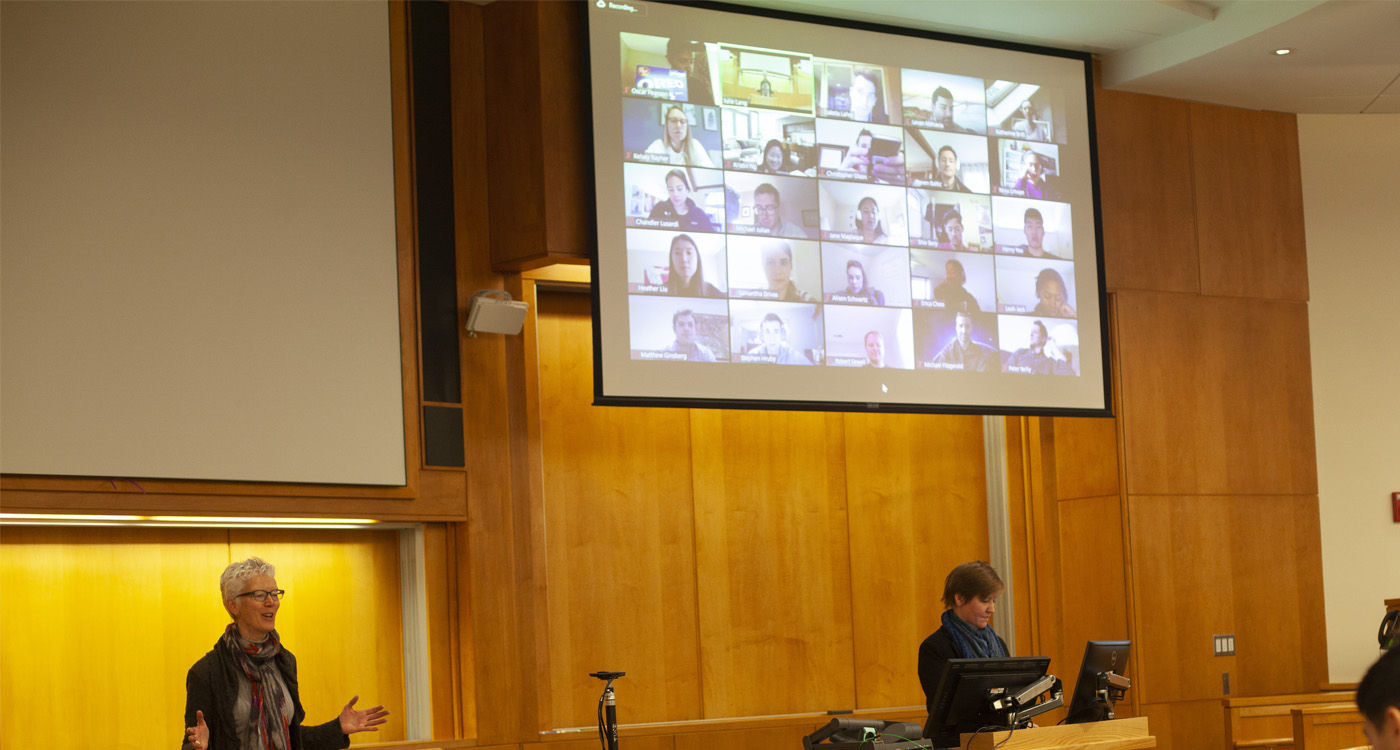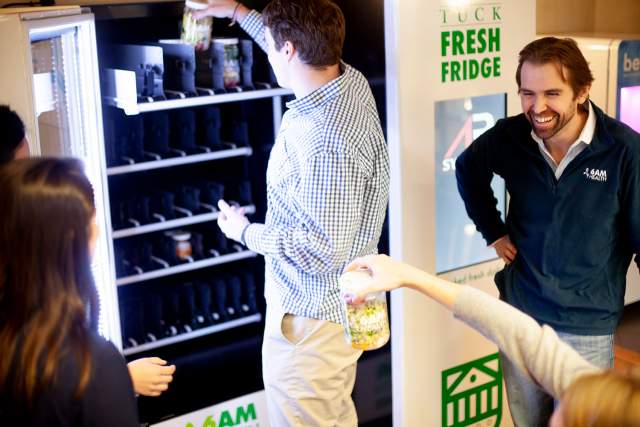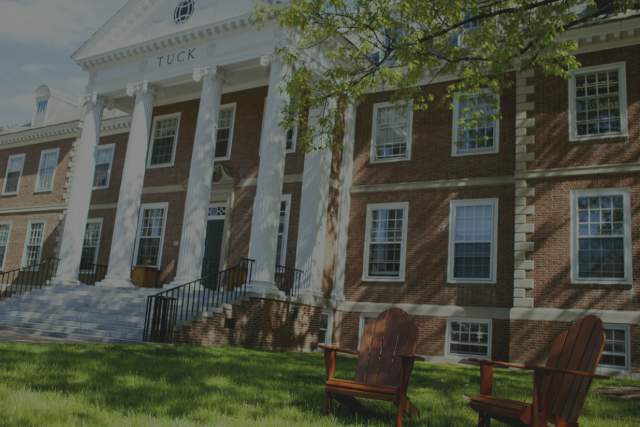First-Year Projects Provide Expert-Level Consulting to a Range of Organizations
This spring, 56 teams of first-year students engaged with companies and nonprofits around the world to address real-world business opportunities.

Student teams worked with clients in tech, biotech and health care, food and beverage, the nonprofit space, and more.
Each spring, the entire first-year class at Tuck takes a significant step in their MBA journey, going from pure learners to learner-practitioners.
This development happens within the challenging-yet-safe environment of the First-Year Project (FYP), where teams of students work directly with a wide range of organizations—multinational corporations, early-stage startups, and non-profit and governmental organizations, among others—on a host of real-world business issues of strategic importance.
This year, against the backdrop of a global public health crisis, 56 FYP teams forged ahead through video-conferencing and email communication, showing the resolve, creativity and flexibility of the students and their clients, half of whom are Tuck or Dartmouth alumni.
“We could not be more proud of our teams, or more thankful to our client partners,” says Becky Rice, the director of the FYP course. “Clients stayed with us, even though many were experiencing significant disruption this spring. And teams excelled—providing significant and important insights and solutions. The 2020 FYP was challenging, but will better prepare Tuck students to be global business leaders, managing their organizations through times of ambiguity and adversity.”
As usual, the FYPs in 2020 consulted with businesses across the spectrum of the economy. The largest percentage of clients were in the technology sector (18 percent), followed by food and beverage (16 percent), and a three-way tie between apparel/retail, athletics/sports/recreation, and nonprofit (11 percent). Clients also worked in biotech/health care, education, energy, finance, environment, and manufacturing.
Here’s a closer look at three 2020 FYPs.
Client: NEXT Trucking
Challenge: "Which port should they pursue next?"
Just as Uber revolutionized the taxicab business by connecting passengers with independent drivers, NEXT is a startup doing something similar for the freight and drayage (trucking) industry. The company, which is based in California, has a digital platform and mobile app that allows truckers to connect with shippers, so the truckers can choose when and where to do deliveries, and also efficiently plan routes and the return of truck chassis. “They’re optimizing their platform so truckers spend less time waiting and can quickly go pickup their containers and do a couple of different runs in a day,” explains Matt Ginsberg T’21, a member of the NEXT FYP team at Tuck that included Haylle Reidy, Ned Scadden, Hugo Naulot, and Jocelyn Teece.
Currently, NEXT operates out of the Port of Los Angeles and Long Beach, with pilot programs at the Port of New York and New Jersey, but the company is looking to expand. That’s where the FYP came in. AJ Lee T’13, the vice president of marketing at NEXT this spring, worked with the Tuck team to develop the key question: which ports should the company pursue next?
I knew, going to Tuck, that I wanted to pivot to more of a strategy-focused role. Taking my previous skillset and applying it to this strategic question was something I had really been looking forward to.
In the first phase of the work, the team examined a range of ports and ranked them based on various factors. With that aggregated scorecard for each port and its components, the team decided on a list that represented the best opportunities. In phase two, the team spoke with a number of third-party port personnel, to fine-tune the analysis and make sure that the situation on the ground lined up with the team’s research. That helped the team establish strategies for sequencing and how to go-to-market.
As a legacy industry dealing with logistics, the freight and drayage market is extremely complicated. The team, therefore, had to learn it quickly from the ground up, understand the key challenges, and then shift to a problem-solving mindset. For Ginsberg, who had experience as an economic consultant in the IP field before Tuck, the NEXT project was the perfect opportunity to gain experience at a large startup and hone new skills.
“I knew, going to Tuck, that I wanted to pivot to more of a strategy-focused role,” he says. “Taking my previous skillset and applying it to this strategic question was something I had really been looking forward to.”
Client: International Center of Photography (ICP)
Challenge: "Is online education a good fit?"
The International Center of Photography (ICP), based in New York City, is dedicated to the idea of concerned photography: using photographs to educate and change the world. It advances that mission through its museum and archive, exhibitions, education, and programming. Kate Duff D’02 joined the organization as chief operating officer in the summer of 2019, and soon after heard from a Tuck alumnus about the FYP course. It immediately made sense to her. “I knew that working with Tuck would introduce fresh thinking into the organization and provide a nontraditional way to obtain strategy advice,” she says. “Plus, as a school ourselves, there is tremendous appeal in encouraging student work from all disciplines, from the creative to the more business-oriented.”
During the fall, Duff and the Executive Director of ICP discussed two possible projects: developing a marketing and recruitment strategy for its in-person, one-year certificate program, or researching whether to expand its online education offerings. They ultimately decided to pitch the second one. By early March, when the project began, that choice proved prescient. The coronavirus pandemic had changed the way people worked and learned, and it was clear than online education would be more appropriate than ever. Still, Duff wasn’t assuming it would be a good fit for ICP, so the key question for the Tuck FYP team was this: Should ICP expand its online education program in the next two years? “We wanted to explore how to expand our online program, and do it in a way that would allow ICP to preserve its sense of community and brand,” Duff says.
The Tuck ICP team consisted of T’21s Kate Balderston, Ethan Dobbs, Dylan Guss, Kwabena (KB) Nimo, and Elisabeth Sum. Balderston, an art history major in college, joined the project because she had been a part of the New York City art world and it was a community she wanted to support. The team members came from a variety of backgrounds, but they coalesced under the goal of making this project a learning experience, rather than a chance to polish skills they already had.
Every meeting was structured and they served as true consultants for us, framing the problem, distilling the right questions, and delivering a useful report with competitor benchmarks and recommendations.
The students established workstreams for surveys, stakeholder interviews, and market research, dividing up the tasks according to the team members’ interests and experience. Balderston worked on the survey workstream, pairing up with a team member who had done survey analysis before Tuck. She was also the client manager, acting as the liaison between the team and ICP to set up and run meetings and make sure the team-client relationship was strong. For this, Balderston drew on her business development experience at a branding firm prior to Tuck.
During the course of the project, it was clear to Duff that the students’ work would be extremely helpful to ICP. “They were very professional and productive,” she says. “Every meeting was structured and they served as true consultants for us, framing the problem, distilling the right questions, and delivering a useful report with competitor benchmarks and recommendations.”
Balderston and Dobbs enjoyed the project so much, they decided to keep working for ICP after it ended. Balderston is doing some volunteer work for the organization before her official summer internship begins at another employer, and Dobbs is doing his internship for ICP. “This project reminded me how much I do love the art world,” Balderston says. “It definitely opened my eyes to the business challenges in the arts and non-profits.”
Client: Ecolab
Challenge: "How should we position our proprietary software platform?"
Ecolab is a global leader in water, hygiene, and infection prevention solutions and services. Part of its business provides chemicals to oil refineries so their equipment doesn’t get contaminated by the various types of crude oil they process. Over the decades in this business, Ecolab has collected data that can predict the stability and risk of mixing crude oils from different locations. The company has baked this data into its proprietary software platform CrudeFlex Digital. The key question for the Tuck FYP was how to best position this platform in the next 12 months.
“This project is about one of our most important new products launched last year in our division,” says Flora Tian T’19, a financial analysis manager at Ecolab who worked with the Tuck team this spring. The team was composed of T’21s Travis Fei, Soichiro Ochiai, Tiago Lemos Franciscone da Rosa, Louis Liu, and Henry Zuo.
The team collaborated with Tian and others at Ecolab to divide the main question into four sub-questions: which monetization models to use, how to prepare the organization to operate on this model, how to measure and track the success of the innovation, and what are the potential risks.
Fei chose this project because of its complexity and challenge, and to have a chance to apply lessons from courses such as Management Communications, Client Project Management, and Advanced Management Communications. In those courses Fei learned how to execute a project from end to end, how to present a slide deck, and how to facilitate a meeting with an agenda, among other things. “I didn’t realize how important those skills are until we put them into practice in the FYP,” he says.
He also learned the power of the Tuck network. This project concerned a very technical product in an industry he and his team were not familiar with. “But we had a large expertise pool we could draw on, so we interviewed a lot of Tuck alumni who are experts in oil and gas, and digital platforms. They were all very nice and helped us a lot,” he says.
Luke Wegner, the vice president of finance for Ecolab Downstream, came away impressed by the team’s work. “The students only worked on this project for a short two months between their other courses,” he says, “but they produced so many great insights with many case studies and best practices that our organization can learn from.”

